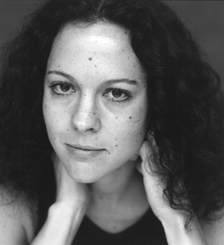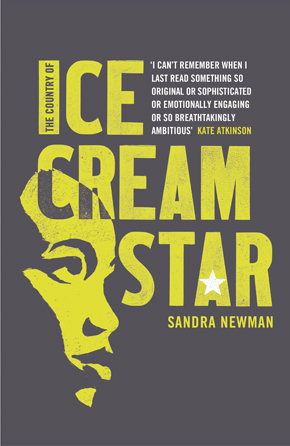Be how it begin
by Sandra NewmanThe Country of Ice Cream Star began with the idea of a world in which people only live to be 18–19 years old. I don’t know where that idea came from. There are other similar themes in literature, but I wasn’t consciously thinking of them. The idea seemed rather like it was always waiting in my head for the moment when I wanted it.
So I began the book with this simple idea of a world inhabited only by teens and children. I invented a plague that had killed most of the world’s population outright a long time ago, and which people still died of before the age of twenty. The idea was immediately exciting to me; I was in the middle of writing a non-fiction book, but I stole time from it to work on Ice Cream Star (whose name came to me long before I knew anything else about the novel).
The first problem came, however, as soon as I started setting words on the page.
I’ve been reading sci-fi for as long as I’ve been big enough to turn the pages of books without help. So I’m accustomed to books where characters who live in the year 2800 speak in contemporary English. Authors usually invent some future language, so that there’s some fuzzy notion that the characters are really speaking Amanglic or Galactic Standard or Neo-Chinese, and the book was translated into English by… well, just don’t think about that. And, personally, this has never bothered me. You can’t have fiction set in the future (or any fiction at all) without some suspension of disbelief.
But when I started writing my own book, this problem of language bothered me from word one. I was writing in the voice of a contemporary fifteen-year-old, and it just felt false. I couldn’t write a sentence without thinking, “No, she wouldn’t talk that way, it’s all wrong.”
I wanted it to feel like a genuine patois; something with its own flavour... Start with the slang we have now, and fast-forward eighty years – what would you expect to find?”
So I started to think about what kind of language might sound right. The first thing I knew was that it wasn’t enough to drop in a few invented slang words here and there. Whenever I see writers doing that, it comes across as fake and a little ridiculous. No, I wanted it to feel like a genuine patois; something with its own flavour.
This led me to think seriously about how American English would change if there were a real plague, leaving isolated bands of real kids talking the way they do now. Start with the slang we have now, and fast-forward eighty years – what would you expect to find?
I started poking around, looking at contemporary slang. And my immediate sense was that most of the vitality of contemporary American slang comes from the African-American community. Even if you started with a community of 20 white kids in Maine, they would be using a lot of phrases taken directly from Ebonics. And as soon as I started seriously engaging with African-American English, I fell in love. It wasn’t just beautiful and funny and expressive – it was easy. I sat down and thought, “So not Ebonics, but imaginary future Ebonics…” and in an hour, I had the first page of Ice Cream Star. I added a little French here and there; I invented a word here and there. Small differences in grammar also came from all over the place. But it retained the flavour of African-American English. And somehow it was Ice Cream’s voice; finally she was speaking to me.
Once I’d done that, though, I began thinking seriously about the race of my future Americans. Initially, I’d thought they would just be a typical American mix… but then I thought, why can’t they just be black? And somehow, I could immediately see that it made the book more powerful. It’s hard to say why or how, but I liked the characters more. They began to feel like real people instead of characters I was inventing.
I knew that a stranger had to appear – a stranger who is thirty years old, and may therefore know of a cure for the disease that kills them all. And it now seemed natural that he would be white. He’s the first white person they’ve ever seen, he’s the first adult they’ve ever seen, he doesn’t speak their language. He doesn’t make sense in terms of their world. In every way, Pasha is an out-of-context problem.
At this point, the easy part was over. I spent the rest of the novel trying to figure out where Pasha came from, and what that meant for Ice Cream and her people. Of course, we know that when white people appear, it is not good news. (I could have gone against this assumption, but really, for an author, bad news = good plot.) But what kind of bad news? How would Ice Cream’s people meet it? It took three years and 650 pages to satisfyingly answer those questions.
 Sandra Newman was born in America and lived in England for twenty years before returning to New York. Her professions have ranged from academia to professional gambling. Her first novel, The Only Good Thing Anyone Has Ever Done (2003), was shortlisted for the Guardian First Book Award. Her second novel Cake was published in 2007 and her memoir Changeling in 2010. She is also the author of The Western Lit Survival Kit: How to Read the Classics Without Fear and co-author of How NOT to Write a Novel. The Country of Ice Cream Star is published by Chatto & Windus. Read more.
Sandra Newman was born in America and lived in England for twenty years before returning to New York. Her professions have ranged from academia to professional gambling. Her first novel, The Only Good Thing Anyone Has Ever Done (2003), was shortlisted for the Guardian First Book Award. Her second novel Cake was published in 2007 and her memoir Changeling in 2010. She is also the author of The Western Lit Survival Kit: How to Read the Classics Without Fear and co-author of How NOT to Write a Novel. The Country of Ice Cream Star is published by Chatto & Windus. Read more.
Author portrait © Charles Hopkinson


